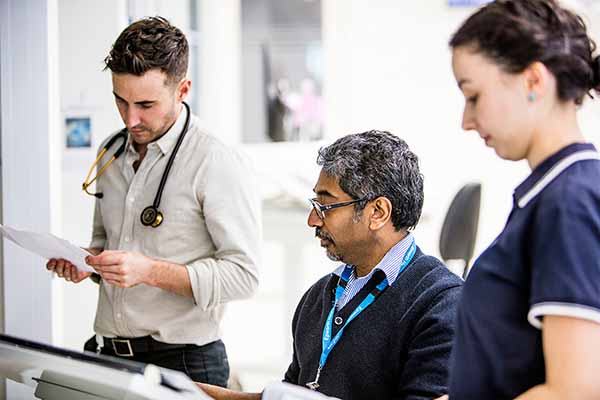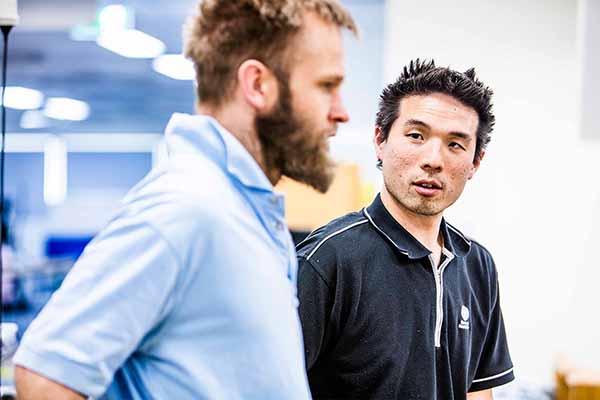Overview
Liver cancer at Epworth
Learning that you or someone you care for has liver cancer can be a very overwhelming and frightening experience. From initial diagnosis through to cure or relapse, our Epworth cancer care team are here to support you at every step of your cancer care journey.
Each person living with liver cancer has individual needs depending on their symptoms, condition, and the stage of their cancer. Our team will proactively adjust the level of emotional and physical care provided to best suit your changing care needs and provide further options of support such as physiotherapy, dietitians, and psychologists.
Epworth fact sheet | Liver cancer
-
What is liver cancer?
Primary liver cancer is when cancerous cells (such as tumours) begin to grow in the liver. Secondary liver cancer is the most common type of cancer and occurs when other types of cancers such as breast cancer or stomach cancer has spread to other parts of the body such as the liver.
-
What are the types of liver cancer?
There are three main types of liver cancer:
- Hepatocellular carcinoma
Hepatocellular carcinoma is the most common type of liver cancer and usually develops when the patient also suffers from chronic liver disease. - Cholangiocarcinoma
Cholangiocarcinoma is a rare type of liver cancer. It is also known as bile duct cancer as the cancer begins in the connecting tubes that take bile from the liver and pass it to the small bowel. - Angiosarcoma
Angiosarcoma is another type of rare liver cancer. This form of liver cancer starts to grow in the inner lining of the liver blood vessels.
- Hepatocellular carcinoma
-
What are the risk factors for liver cancer?
Factors that may put you at higher risk of developing liver cancer include:
- Hepatitis B or C are the biggest known risk factors for liver cancer in Australia
- Age (Those over 70 are more likely to develop angiosarcoma)
- Smoking
- Chronic liver disease
- Excessive drinking
- Men are more likely than women to develop liver cancer
- Being overweight
Signs and symptoms of liver cancer
It's natural and common for changes to occur to your body as you age or go through stressful periods. However, we encourage you to recognise what is normal for your body and if changes are persistent consult your GP for peace of mind.
Symptoms and signs
Symptoms can be subtle or easily attributed to other causes but finding cancer early is crucial.
Symptoms of liver cancer can include:
- Dark urine
- Fatigue
- Weight loss
- Lower abdomen pain
- A fever that is not caused by an infection and that does not go away
- Yellowing of the skin and eyes (jaundice)
- Itchy skin
- Swollen abdomen caused by fluid build up (ascites)
- Pale bowel movements
Notice changes and act quickly
Diagnosing liver cancer
Screening for liver cancer
A screening test allows a doctor to routinely check for types of cancer such as breast cancer. Unfortunately, there is currently no screening test for liver cancer.
How is liver cancer diagnosed?
Epworth provides its patients with access to several thorough diagnostic tests to further investigate signs and symptoms of liver cancer.
To investigate your health concerns, your doctor may schedule one or several of the following liver cancer tests:
Blood tests
Though blood tests are not a diagnostic tool for liver cancer, blood tests may be scheduled by your doctor during your first consultation to check your overall liver, blood, and liver health.
Biopsy
A biopsy is the removal of a small piece of tissue that will be examined under a microscope. Your doctor may request that you undergo a biopsy either by key hole surgery (general anaesthetic) or fine needle aspiration (which only requires local anaesthetic) to determine whether you have liver cancer.
Imaging tests
Depending on symptoms, your doctor and care team may schedule imaging tests to assess or diagnose your cancer. Each imaging test provides your care team with a different view of your body, some common scans for liver cancer include an Ultrasound, CT, or MRI.
Staging - Investigating the extent of the cancer
Your Epworth specialist may recommend additional tests to understand whether the cancer has spread.
These tests will allow your care team to establish your cancer as a stage, using a method called the Barcelona Clinic Liver Cancer (BCLC) staging system. Staging helps your care team and specialists to create a unique treatment plan.
The Barcelona Clinic Liver Cancer staging system has 5 stages:
- 0 (very early)
- A (early)
- B (intermediate)
- C (advanced)
- D (end-stage).
Learn more about liver cancer staging: Cancer Council
Find your Epworth liver cancer specialist
Gastroenterologists | Hepatopancreatiobiliary (HPB) surgeons | Medical oncologists | Radiation oncology service
Treatment for liver cancer
We understand that treatment options can be overwhelming. Epworth oncologists and specialists are here to guide and support you to make the best choice for your health.
Liver cancer treatment at Epworth
Following a diagnosis of liver cancer, your oncologist and cancer care team will create a treatment plan tailored to the specific stage and type of cancer. Your Epworth specialist will discuss the treatment options with you and consider your circumstances and your preferences.
Below is an overview of common liver cancer treatments:
Radiofrequency ablation
Radiofrequency ablation is a type of liver cancer treatment that uses heat to destroy cancer cells.
Surgery
Depending on the stage of your liver cancer and where the tumours are, your care team may recommend one of two forms of liver cancer surgery:
- Partial hepatectomy: During partial hepatectomy surgery a section or all of the tumour is removed from the liver. If the liver is not damaged, the remaining part can regenerate and heal following the surgery.
- Liver transplant: Depending on your age, circumstances and stage of liver cancer, your doctor may recommend that the entire liver is removed and replaced by a donor liver.
Chemotherapy
Chemotherapy is a common form of treatment that involves the use of anti-cancer drugs to attack cancer cells. Chemotherapy is often used alongside other treatments such as surgery or radiotherapy.
Radiotherapy
Radiotherapy is the use of radiation to treat and manage cancer. Radiotherapy at Epworth is supported by the latest world-class technology and evidence-based techniques, highly experienced team of radiation oncologists, radiation therapists, physicists and nurses are committed to providing compassionate, exceptional care.
Targeted therapy
If you have a certain type of liver cancer, such as hepatocellular carcinoma, you may be recommended targeted therapy. This type of treatment targets features of cancer cells to stop them growing.
Why choose Epworth for cancer care?
Epworth HealthCare is Victoria's largest not-for-profit private hospital group, renowned for excellence in diagnosis, treatment, care and rehabilitation. Epworth is an innovator in Australia’s health system, embracing the latest in evidence-based medicine to pioneer treatments and services for our patients.
Supported by excellent facilities, we integrate clinical practice with education and research to deliver outstanding patient care, each and every day.
Epworth cancer care locations
Epworth Rehabilitation
Liver cancer locations:
Liver cancer rehabilitation
Who is the program for?
Rehabilitation doesn't start after your treatment has ended. You may benefit from our holistic rehabilitation programs at any time throughout your cancer journey. Our programs can support you to physically and emotionally prepare for treatment and restore your strength and wellbeing.
What does the cancer rehabilitation program involve?
Before you start
You will meet a rehabilitation doctor and allied health team for a medical, psychosocial, and physical assessment.
Everyone's cancer care journey is different. The assessments will help the team understand your specific needs to develop the right program for you. You will work with the team to develop goals to work towards throughout the program.
During the program
Depending on your assessment and individual needs, you may complete your program:
- as part of a group, with other people, who have been diagnosed with varying cancers
- on your own
Most people will attend as an outpatient, coming to hospital for a few hours once or twice a week, over several weeks. Some people may need to stay overnight in hospital and complete a program over several consecutive days.
Either way, you will receive the same support from our team to address your physical, functional and emotional needs.
Your program may include:
- A physical exercise component to help restore movement, strength and fitness
- An educational component where you will learn about different areas associated with your cancer diagnosis and treatment and how to manage them, including:
- fatigue
- pain
- emotional wellbeing
- body image and self-esteem
- work or family challenges
- relationships
- late-onset of side effects.
At the end of your program
Our rehabilitation team will keep in touch with your referring doctor and/or treating team throughout the program and our team will keep them informed about your progress.
They will also connect you to local services and support networks so you can leave our program with the strength and confidence to live life to your fullest potential.
Who will support me during the rehabilitation program?
Depending on your needs, you may see some or all of our multidisciplinary team which includes:
- Rehabilitation specialist doctor
- Cancer nurse
- Exercise physiologist
- Physiotherapist
- Psychologist
- Social worker
- Occupational therapist
- Dietitian.
How can I access a rehabilitation program?
Referrals
A referral from your specialist or GP is required to participate.
Ask your doctor to complete the referral form at www.epworth.org.au/rehab and return it to us via fax: 03 9982 6696 or email: [email protected]
Locations
Group programs are located at Epworth Camberwell and Epworth Hawthorn.
Individual programs can be accessed at Epworth Brighton, Epworth Camberwell, Epworth Geelong, Epworth Hawthorn or Epworth Richmond Rehabilitation.
Contact us
If you have any questions about our cancer rehabilitation programs, call us on: 1300 345 600.
Life after liver cancer treatment
Life after liver cancer treatment can pose its own challenges but our Epworth specialists are here to support you.
Life after treatment
Life after liver cancer treatment can be a mixture of emotions. You may not 'bounce back' as quickly as you like, but be kind to yourself and start making plans with your family or carers.
Remember that:
- You may still feel fatigued for a while after finishing treatment.
- If required, make an advanced care plan.
- Ask for help. If your body has changed due to treatment, remember help is out there to support you to feel your best and regain your sense of identity and self-esteem. Speak with your care team about options to support your general wellbeing after treatment.
Follow-up appointments
Epworth patients in remission for liver cancer will likely need follow-up appointments to ensure abnormal cells have not returned and to check in on your overall wellbeing.
Managing your health and wellbeing ongoing
Knowing how to best manage your wellbeing ongoing is an essential step toward recovery. We encourage people who have been living with liver cancer to seek as much information as possible to support their decision making and cancer journey. Below are some recommended websites:
Palliative care
Palliative care may be discussed with you and your family in some cases. Epworth palliative care aims to relieve you of symptoms and manage pain.
Find your Epworth liver cancer specialist
Gastroenterologists | Hepatopancreatiobiliary (HPB) surgeons | Medical oncologists | Radiation oncology service


